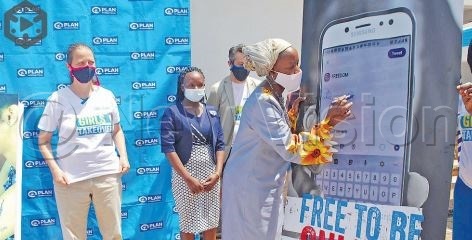'58% of girls harassed online'
Online harassment is against the law and falls under the Computer Misuse Act as cyber harassment.
ONLINE HARASSMENT|SOCIAL MEDIA|PORNOGRAPHY
KAMPALA - Margaret Nyirarukundo, 19, is one of the many women that have been harassed online, especially on social media.
In June last year, an unidentified person hacked into Nyirarukundo's Facebook account and posted pornographic materials on her account, tarnishing her image .
"As a result of the post, I lost many close friends and family members who were convinced that I was immoral and a bad influence," she reveals.
Nyirarukundo is one of the 58% of girls that have been harassed online, according to a report by Plan International, a non-governmental organisation.
The state of the world report dubbed Free To Be Online indicates that due to harassment, 19% of such girls have left or significantly reduced use of social media.
Another 12% girls, according to the report, have changed the way they express themselves online.
The report points at attacks being mostly common on Facebook, where 39% say they have suffered harassment.
Globally, the harassment statistics are Instagram (23%), WhatsApp (14%), Snapchat (10%), Twitter (9%) and TikTok (6%).
This research was based on a survey of 14,000 girls aged 15-25 in 22 countries. These were taken through a series of in-depth interviews.
The United Nations (UN) in 2012 recognised the Internet as a human right that should be respected by everyone.
What the law says
Online harassment is a form of bullying using electro means. Online harassment is against the law and falls under the Computer Misuse Act as cyber harassment.

A person who commits this offence is liable, if convicted, to imprisonment of up to three years or a fine of sh1,440,000 or both.
The report launch
The report was launched at Plan International offices in Kampala on Wednesday in commemoration of the International Day of the Girl Child, which is celebrated annually on October 11.
While launching the report, the head of programmes at Plan International Uganda, Greg Lavende, said the study found that girls who use social media in high and low income countries are routinely subjected to explicit messages, pornographic photos, cyber stalking and other distressing forms of abuse.
"This abuse also damages girls' lives offline, with 22% of those surveyed saying they or a friend have been left fearing for their physical safety, while 44% say social media companies need to do more to protect them," he said.
Lavender said reporting tools are ineffective in stopping the rampant vice of harassment.
Plan International Uganda country director Iveta Ouvry said these online attacks may not be physical, but they are often threatening and limit girls' freedom of expression.
"Driving girls out of online spaces is hugely disempowering in an increasingly digital world, and damages their ability to be seen, heard and become leaders," Ouvry said.
Government position
State minister for youth and children affairs Florence Nakiwala Kiyingi said the Government will launch an app that is meant to give girls freedom to report cases online.
"Before, they would go to the Police and they would be messed up there and could not receive justice instantly. You find a girl who was raped at five years and has turned 18years without attaining justice. This app is to help the offended get justice quickly," she said.